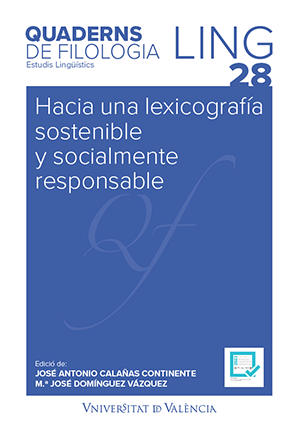Principles for a Socially Responsible Lexicography from a Glotopolitical Perspective
DOI:
https://doi.org/10.7203/qf.0.26594Keywords:
Lexicography, glotopolitics, social responsibility, ideology, dictionary. Abstract
Abstract
This paper is offered as a theoretical proposal in which the bases for a socially responsible lexicography are defined. Dictionaries’ importance as prestige language instruments that legitimize usage and language varieties and which, particularly in the case of Spanish, help create social and political subjectiveness is taken as the point of departure. The glotopolitical perspective that is adopted is that of Arnoux (2016) and Del Valle, Lauria, Oroño and Rojas (2021), which focuses on the linguistic subject by assuming it can not separated from politics and when analyzing it takes into account its material conditions vis-à-vis production, reproduction and reception, as well as its involvement in the processes governing access to and consolidation of power.
 Downloads
Downloads
Downloads
Published
How to Cite
-
Abstract646
-
PDF (Español)349
Issue
Section
License
 Este obra está bajo una licencia de Creative Commons Reconocimiento-NoComercial-SinObraDerivada 4.0 Internacional.
Este obra está bajo una licencia de Creative Commons Reconocimiento-NoComercial-SinObraDerivada 4.0 Internacional.
Authors who publish with this journal agree to the following terms:
- Authors retain copyright and grant the journal right of first publication with the work simultaneously licensed under a Creative Commons Attribution License that allows others to share the work with an acknowledgement of the work's authorship and initial publication in this journal.
- Authors are able to enter into separate, additional contractual arrangements for the non-exclusive distribution of the journal's published version of the work (e.g., post it to an institutional repository or publish it in a book), with an acknowledgement of its initial publication in this journal.
- Authors are permitted and encouraged to post their work online (e.g., in institutional repositories or on their website) prior to and during the submission process, as it can lead to productive exchanges, as well as earlier and greater citation of published work (See The Effect of Open Access).



